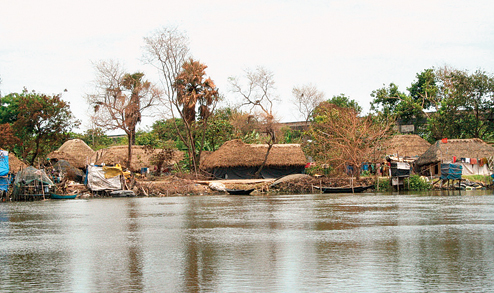 |
| File picture of a water body near Paradip affected by industrial waste |
Paradip, Oct. 17: Air and water pollution allegedly being perpetrated by fertiliser plants following gypsum deposits has come under the Odisha State Pollution Control Board’s scanner.
With accumulated gypsum industrial waste assuming a huge proportion, the board has decided to conduct an impact assessment study to find out the level of pollution.
“The aim of the impact assessment study is to ascertain the level of pollution being caused following piling up of gypsum materials by the plants. Scientists of the board and environment experts from the Indian Institute of Technology will carry out the study,” said the board’s regional officer Prasant Kumar Kar.
The fertiliser plants — Paradeep Phosphates Limited (PPL) and Indian Farmers Fertilisers’ Co-operative Limited (Iffco) — are generating gypsum waste deposit to the tune of 25 lakh tonnes annually. On an average, 2.5 lakh tonnes add to the waste deposit every month. Both the plants are found wanting in finding ways and means to clear off the waste on time.
The PPL plant recently faced charge of dumping solid waste outside the factory premise at Bhitargada near Paradip township. Besides, there has been allegation that it was found wanting in putting in place the pollution control mechanism by stopping emission of pollutant dust particles in the air. The ambient air quality both in and outside the plant had deteriorated from the prescribed limit. The board had a made an on-the-spot investigation and fled cases against the plant management under the Air (Prevention and Control of Pollution) Act, 1981, provisions.
A House committee, during its visit on January 4, had expressed concern over the rising pollution level in the port township and adjoining localities.
Green activists blame both the fertiliser manufacturing units for leaving the gypsum mounds disorganised.
General manager (personnel and administration), PPL, P.K. Panda said: “The plant is intent on maintaining ambient air and water quality in and around the plant site. We are judiciously using gypsum as fertiliser in crop fields. It is emerging as a utility bi-product. The Odisha Agro Industries Corporation, besides other private agro-organisations, are regular buyers of gypsum.”
An Iffco official said: “We are planning to put to use the gypsum waste into load-bearing construction materials. To get rid of gypsum mounds, Iffco is planning to turn the wastes into load-bearing panels and walls. It would come in handy and cost-effective for building construction activity.”










